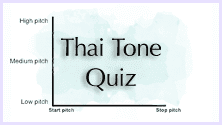Learn Everyday Thai With Kruu Jiab
ภาษาวิบัติ : Paa-săa Wí-bùt
= Sloppy language (careless and unsystematic speech, or an excessively casual language. It appertains to a lack of discipline in sentence structure)
[วิบัติ : Wí-bùt = [modifier] disastrous, destructive, ruin [noun] calamity, catastrophe]
ภาษาวัยรุ่น : Paa-săa Wai~Rôon
= Teenage language / Teenage ways
Introduction: This amusing post is about a conversation between a young cat and a young owlet who are arguing about who they are.
The punch line in this conversation is the homonym เค้า : Káo which is an informal addressing word using to address oneself, typically used among young people. เค้า : Káo has the same pronunciation with the word เค้า : Káo used in the compound word เค้าแมว : Káo~Maew meaning owlet. Let’s see what this confusion is all about!
Note: เค้า : Káo is also the informal pronunciation of เขา : Kăo = he/she/him/her/his/hers = he/she/him/her/his/hers’
Culture and addressing words:
In different social groups and situations, for example, official, formal, informal, young peoples language, feminine language or masculine language, etc., there are many different addressing words used in Thai society.
แมว “ ตะเองเป็นใครอ่ะ”
เค้าแมว “ เค้าแมว”
แมว “ เค้าตะหากแมว ตะเองไม่ใช่แมว”
เค้าแมว “ เค้าก็เค้าแมวไง”
แมว “ ไม่สิ เค้าเนี่ยแมว ตะเองไม่ใช่แมว”
เค้าแมว “ ก็เค้าเนี่ยเค้าแมว”
แมว “ อ่ะ แมวก็แมว”
เค้าแมว “ ไม่ๆ ไม่ใช่แมว เค้าแมว”
แมว “ ตกลงตะเองเป็นแมวหรือไม่ใช่แมวกันแน่”
เค้าแมว “ ไม่ใช่แมว”
แมว “ แล้วตะเองเป็นอะไร”
เค้าแมว “ เค้าแมว”
แมว “ ตะเองกวนตีนว่ะ”
Maew “ Dtà~E_ng Bpe’n Kai? À”
Káo~Maew “ Káo~Maew”
Maew “ Káo Dtà-Hàak Maew. Dtà~E_ng Mâi~Châi Maew”
Káo~Maew “ Káo Gôr Káo~Maew Ngai!”
Maew “ Mâi Sì! Káo Nîa Maew. Dtà~E_ng Mâi~Châi Maew”
Káo~Maew “ Gôr Káo Nîa Káo~Maew”
Maew “ À, Maew Gôr Maew”
Káo~Maew “ Mâi Mâi. Mâi~Châi Maew. Káo~Maew”
Maew “ Dtò’k~Lo’ng, Dtà~E_ng Bpe’n Maew Rŭee Mâi~Châi Maew Gun~Nâe”
Káo~Maew “ Mâi~Châi Maew”
Maew “ Láew Dtà~E_ng Bpe’n À-rai?”
Káo~Maew “ Káo~Maew”
Maew “ Dtà~E_ng Guan~Dteen Wà”
Note: Words/letters in brackets (_) can be omitted. For example, You can pronounce Dt(u)à~E_ng properly as Dtua~E_ng or informally as Dtà~E_ng
Conversation:
แมว “ตะเองเป็นใครอ่ะ”
Maew “Dtà~E_ng Bpe’n Kai? À”
Note: ตัวเอง / ตะเอง : Dt(u)à~E_ng = [noun] oneself (It is also used among young people as an addressing word ‘you’. It’s got feminine feeling)
Grammar: Elision is the omission of one or more sounds (such as a vowel, a consonant, or a whole syllable) in a word or phrase, producing a result that is easier for the speaker to pronounce. (as in gonna, wanna, innit, fam(i)ly im (him))
เค้าแมว “เค้าแมว”
Káo~Maew “Káo~Maew”
Note: เค้าแมว : Káo~Maew is a compound word combined from เค้า : Káo = [noun] sign, outline and แมว : Maew = cat
The confusion started when the young owlet answers shortly with just the word ‘เค้าแมว : Káo~Maew’ as it can be misunderstood as she/he is saying a grammatically incorrect sentence ‘เค้าแมว : Káo Maew’ meaning ‘I cat’ which is shortened from a grammatically correct sentence ‘เค้าเป็นแมว : Káo Bpe’n Maew’ meaning ‘I am a cat’
If the young owlet has answered with a grammatically correct sentence ‘เค้าเป็นเค้าแมว : Káo Bpe‘n Káo~Maew = I am an owlet’ or using a different addressing word like ‘ฉัน / ผม : Chŭn / Pŏ’m’ , it would be easier to understand.
แมว “เค้าตะหากแมว ตะเองไม่ใช่แมว”
Maew “Káo Dtà-Hàak Maew. Dtà~E_ng Mâi~Châi Maew”
Note: ไม่ใช่ : Mâi~Châi = [negative modifier] 1. not right/correct 2. be/is/am/are not
เค้าแมว “เค้าก็เค้าแมวไง”
Káo~Maew “Káo Gôr Káo~Maew Ngai!”
Note: ไง : Ngai = [certainty modifier/emphasiser]
The feeling of ไง : Ngai slightly changes depending on the preceding text and context e.g.
มันอยู่(ที่)นี่ไง
Mun Yùu (Têe)~Nêe Ngai
it + be/is/am/are (location) + this place/here + certainty emphasis
It’s here! Where else could it be?! / It’s been here all along!
Kruu Jiab’s analysation / theory:
ไง : Ngai is originally a shortened form of a long expression used to emphasis certainty or doubtless e.g.
Long expression:
มันอยู่(ที่)นี่ มันจะไปอยู่ที่อื่นได้อย่างไร/ยังไง/ไง คุณน่าจะเจอมันตั้งนานแล้ว
Mun Yùu (Têe)~Nêe. Mun Jà Bpai Yùu Têe Ùeen Dâi Yàang~rai/Yung~ngai/Ngai? Koon Nâa Jà Jer Mun Dtûng Naan Láew
It + be/is/am/are (location) + place~this. it + will + to go + be/is/am/are (location) + place + other + can/possible + how?. you + should + will + find + it + so much as + long time + already
It’s here. Where else could it be?! You should have found it long ago.
Short expression:
มันอยู่(ที่)นี่ไง คุณน่าจะเจอมันตั้งนานแล้ว
Mun Yùu (Têe)~Nêe Ngai! Koon Nâa Jà Jer Mun Dtûng Naan Láew
Long expression:
ฉันจะไปทำงาน ฉันจะไปทำอย่างอื่นได้อย่างไร/ยังไง/ไง คุณก็รู้
Chŭn Jà Bpai Tum Ngaan. Chŭn Jà Bpai Tum Yàang Ùeen Dâi Yàang~rai/Yung~ngai/Ngai? Koon Gôr Rúu
I + will + to go + to do + job/work. I + will + to go + to do + sort/type/kind + other + can/possible + how?. You + then/so/therefore + to know
I will go to do work. What else could I be doing?! You know it.
Short expression:
ฉันจะไปทำงานไง คุณก็รู้
Chŭn Jà Bpai Tum Ngaan Ngai! Koon Gôr Rúu
แมว “ไม่สิ เค้าเนี่ยแมว ตะเองไม่ใช่แมว”
Maew “Mâi Sì! Káo Nîa Maew. Dtà~E_ng Mâi~Châi Maew”
Note:
เนี่ย : Nîa = [modifier] here! / this is it! (It is used as an emphasis. It’s a contracted word from นี่ : Nêe = [distance modifier] this / here and ไง : Ngai = what ways / how (else). นี่ไง : Nêe~ Ngai = It’s here! / This is it!
เนี่ย : Nîa = [particle] showing unsureness
e.g. คุณจะไปทำงานหรือเปล่าเนี่ย : Koon Jà Bpai Tum Ngaan Rŭee~Bplào? Nîa = Will you go to work or not? huh?
Grammar: Contraction is a shortened version of the written and spoken form of a word, syllable, or word group, created by omission of internal letters (as in It is = It’s, do not = don’t, let us = let’s, I am = I’m, You are = You’re)
เค้าแมว “ก็เค้าเนี่ยเค้าแมว”
Káo~Maew “Gôr Káo Nîa Káo~Maew”
แมว “อ่ะ แมวก็แมว”
Maew “À, Maew Gôr Maew”
เค้าแมว “ไม่ๆ ไม่ใช่แมว เค้าแมว”
Káo~Maew “Mâi Mâi. Mâi~Châi Maew. Káo~Maew”
Grammar note: In Thai, we repeat a word to emphasise/exaggerate the amount of quality or quantity.
แมว “ตกลงตะเองเป็นแมวหรือไม่ใช่แมวกันแน่”
Maew “Dtò’k~Lo’ng, Dtà~E_ng Bpe’n Maew Rŭee Mâi~Châi Maew Gun~Nâe”
Note:
ตกลง : Dtò’k~Lo’ng = 1. [verb] to agree 2. [modifier] ok (used to express agreement or acceptance) 3. [exclamation] ok (used to introduce an utterance)
กันแน่ : Gun~Nâe = [certainty modifier used after Wh-question words or alternative questions] which one is the one / (what/where/when/who/how/how much/how many) is certain?
e.g. คุณทำอะไรกันแน่ : Koon Tum À-rai? Gun~Nâe = What actually are you doing?
คุณอยู่ที่ไหนกันแน่ : Koon Yùu Têe~Năi? Gun~Nâe = Where are you actually at?
เค้าแมว “ไม่ใช่แมว”
Káo~Maew “Mâi~Châi Maew”
แมว “แล้วตะเองเป็นอะไร”
Maew “Láew Dtà~E_ng Bpe’n À-rai?”
เค้าแมว “เค้าแมว”
Káo~Maew “Káo~Maew”
แมว “ตะเองกวนตีนว่ะ”
Maew “Dtà~E_ng Guan~Dteen Wà”



